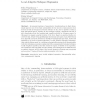Free Online Productivity Tools
i2Speak
i2Symbol
i2OCR
iTex2Img
iWeb2Print
iWeb2Shot
i2Type
iPdf2Split
iPdf2Merge
i2Bopomofo
i2Arabic
i2Style
i2Image
i2PDF
iLatex2Rtf
Sci2ools
NPL
1998
1998
Local Adaptive Subspace Regression
Abstract. Incremental learning of sensorimotor transformations in high dimensional spaces is one of the basic prerequisites for the success of autonomous robot devices as well as biological movement systems. So far, due to sparsity of data in high dimensional spaces, learning in such settings required a significant amount of prior knowledge about the learning task, usually provided by a human expert. In this paper we suggest a partial revision of the view. Based on empirical studies, we observed that, despite being globally high dimensional and sparse, data distributions from physical movement systems are locally low dimensional and dense. Under this assumption, we derive a learning algorithm, Locally Adaptive Subspace Regression, that exploits this property by combining a dynamically growing local dimensionality reduction technique as a preprocessing step with a nonparametric learning technique, locally weighted regression, that also learns the region of validity of the regression. T...
Related Content
| Added | 22 Dec 2010 |
| Updated | 22 Dec 2010 |
| Type | Journal |
| Year | 1998 |
| Where | NPL |
| Authors | Sethu Vijayakumar, Stefan Schaal |
Comments (0)

